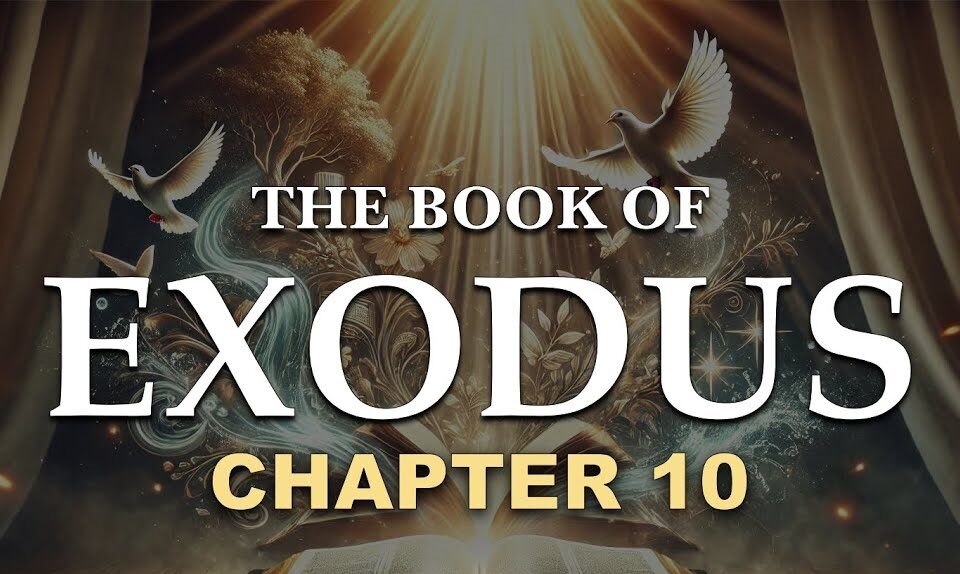Divine Retreat Centre UK – Official Website

Life on Top
August 28, 2023
Exodus Bible Study – Chapter 6
August 28, 2023It’s a common sentiment among some people to say, “If I see God, I would believe him”. But is it true? If we had lived 2,000 years ago and saw Jesus Christ in the flesh, would it make us better Christians? Would be we better off as a people of God if we had been there among the apostles and the first converts to Christianity who made up the early Church? Isn’t this also the reason why so many Christians strive so hard to follow the very lives of the early Christians in order to call their faith authentic?
If any of these questions have crossed your mind, it’s all because of one thing—we don’t understand where God is. We don’t understand what happened to Jesus after His Ascension to heaven. Did He really leave us? Did He just come into the world only to disappear when there was so much dissension between the Jews and the Romans versus all the Christians? What does it mean that “he was lifted up, and a cloud took him out of their sight” (Acts 1:9)? What does it mean that “he withdrew from them and was carried up into heaven” (Luke 24:51). What does it mean that “the Lord Jesus, after he had spoken to them, was taken up into heaven and sat down at the right hand of God” (Mark 16:19).
If we try to find the answers to any of these questions, we can’t depend on our research on the subatomic particles that make up the sky or attempt to search the un-explored places in the solar system. When the disciples of Christ were bewildered at the image of Jesus vanishing into thin air, they also had a moment of struggle to understand it. They were scratching their heads while staring blankly into the clouds. But an angel brought them back to their senses and told them: “Men of Galilee, why do you stand looking up toward heaven? This Jesus, who has been taken up from you into heaven, will come in the same way as you saw him go into heaven” (Acts 1:11).
Jesus was taken up and He will come again… These words were not a new revelation given by the angel. These are the very words of Jesus himself, when he was explaining the mystery of his passion, death, resurrection and ascension to His disciples. Jesus said, “I will not leave you orphaned; I am coming to you. In a little while the world will no longer see me, but you will see me” (John 14:18-19). “I am going away, and I am coming to you” (John 14:28). It all sounds like a riddle that simply implies that the Lord never intended to leave us. But how did He intend to stay and make His presence felt? The answer is through the Holy Spirit. That’s why Jesus had His death intertwined with the coming of the Holy Spirit. “Nevertheless, I tell you the truth: it is to your advantage that I go away, for if I do not go away, the Advocate will not come to you; but if I go, I will send him to you” (John 16:7).
Where is heaven?
If Jesus never left and the Holy Spirit is among us, then where is Heaven? Jesus said, “In my Father’s house there are many dwelling places. If it were not so, would I have told you that I go to prepare a place for you? And if I go and prepare a place for you, I will come again and will take you to myself, so that where I am, there you may be also” (John 14:2-3). Heaven may seem to be a physical place but it’s actually a whole new dimension of existence that is fitting and proper to God. Since God is eternal, He is beyond space and time. He is not limited like us to a certain space and to a certain time. But God transcends space and time. Jesus said, “On that day you will know that I am in my Father, and you in me, and I in you” (John 14:18-20). When Jesus ascended to heaven, He entered into the higher realm of existence wherein He becomes closer to us.
Heaven is God’s dwelling. Everyone who belongs in heaven has a form of existence where they become enhanced and experience the “fullness” of life. The visual explanation given for this is the two-dimensional square becoming a three-dimensional cube, the two-dimensional triangle becoming a three-dimensional pyramid, the two-dimensional circle becoming a three-dimensional sphere. The original form was not lost, but given a fuller shape, a fuller body, and a fuller sense of being.
When Jesus conquered death, sin and the devil on the Cross, “He has put all things under His feet and has made Him the head over all things for the church, which is his body, the fullness of him who fills all in all” (Ephesians 1:22-23). When Jesus ascended to heaven, He was taken into the higher realm or dimension of being, where he is more available to us. He is now here and among us. And, so is heaven. “The kingdom of God is not coming with things that can be observed; nor will they say, ‘Look, here it is!’ or ‘There it is!’ For, in fact, the kingdom of God is among you” (Luke 17:20-21).
What did heaven receive when Jesus was taken up?
On the ascension of Jesus, heaven received something of the earth so both realms become intimately united. The relationship between God and man that was broken by sin has now been mended and reconciled, through Jesus Christ. “Steadfast love and faithfulness will meet; righteousness and peace will kiss each other. Faithfulness will spring up from the ground, and righteousness will look down from the sky” (Psalm 85:10-11). In His descending from and ascending back to heaven, Jesus becomes the fitting mediator between God and humankind. “For there is one God; there is also one mediator between God and humankind, Christ Jesus, himself human, who gave himself a ransom for all—this was attested at the right time” (1 Timothy 2:5-6).
Jesus’ being taken up to heaven had been foreshadowed by the lives of Elijah and Moses. Elijah was taken up to heaven, “As they continued walking and talking, a chariot of fire and horses of fire separated the two of them, and Elijah ascended in a whirlwind into heaven” (2 Kings 2:11). Moses, on the other hand, died and his body went missing mysteriously. “Then Moses, the servant of the Lord, died there in the land of Moab, at the Lord’s command. He was buried in a valley in the land of Moab, opposite Beth-peor, but no one knows his burial place to this day” (Deuteronomy 34:5-6). Their “exodus” to the New Jerusalem (heaven) has now been continued and completed on Jesus Christ’s ascension.
What did Jesus accomplish during ascension?
In heaven, the ascended Lord takes His seat at the Right-Hand Side of the Father. It’s a “seat of power and authority” that signifies Jesus is now governing all and reigning over all with the Father. The witness of Stephen, the first martyr of the Church, proves this: “Filled with the Holy Spirit, he gazed into heaven and saw the glory of God and Jesus standing at the right hand of God. ‘Look,’ he said, ‘I see the heavens opened and the Son of Man standing at the right hand of God!’” (Acts 7:55-56). The extent of Jesus’ humility and obedience made it fitting for Him to be exalted and obtain the vastness of God’s dominion and authority. “God exalted Him and gave Him the name that is above every name, so that at the name of Jesus every knee should bend, in heaven and on earth and under the earth” (Philippians 2:9-11).
With a higher vantage point in heaven, the Lord takes the helm as the Head of the Church and directs all its affairs. What’s the proof of Jesus leadership of the Church? We will see his disciples acting no different from how He himself acted during his public ministry. Jesus’ disciples preached as Christ preached, healed as Christ healed, delivered the afflicted as Christ delivered the afflicted, endured persecution as Christ endured persecution, and conquered the enemy as Christ conquered His enemies. “These signs will accompany those who believe: by using my name they will cast out demons; they will speak in new tongues; they will pick up snakes in their hands, and if they drink any deadly thing, it will not hurt them; they will lay their hands on the sick, and they will recover” (Mark 16:17-18).
If we cannot see Jesus, how does He make Himself physically present among us?
The ultimate Animator of all of Jesus Christ’s action here on earth happens through His Holy Spirit, the third person of the Holy Trinity. “The Advocate, the Holy Spirit, whom the Father will send in my name, will teach you everything, and remind you of all that I have said to you” (John 14:26). In the coming of the Holy Spirit, the disciples were able to understand the necessity for Christ’s passion, death, resurrection and ascension for the salvation of the world. They were able to unravel the mystery about Christ and many of the divine revelations about God written in the Old Testament. “If you believed Moses, you would believe me, for he wrote about me” (John 5:46). With the help of the Holy Spirit, one is able to believe Jesus is truly God. Hence, “no one can say ‘Jesus is Lord’ except by the Holy Spirit” (1 Corinthians 12:3).
Through the Holy Spirit, Jesus brought life into the Church that He established; that He was no longer ever apart from us but He himself has become the Church. He now acts in us, and through us, and among us to continue His ministry on earth.
What does it mean for us that Jesus is in heaven and we are here on earth?
Jesus being in heaven means so much more for us than being able to participate in his spiritual gifts of healing, deliverance, speaking in tongues, preaching, teaching, apostleship and all the other offices in the Church. It also means that, as a body, we are also participating in his Eternal Sacrifice. Since Jesus is the Eternal Son of God, the sacrifice He accomplished on the Cross has an “eternal dimension.” This means, Jesus is eternally offering and presenting His sacrifice to the Father. “When Christ had offered for all time a single sacrifice for sins, ‘he sat down at the right hand of God,’ and since then has been waiting until his enemies would be made a footstool for his feet” (Hebrews 10:12). Jesus is offering His sacrifice continually until His salvation reaches across every generation of humanity.
Jesus fulfills this great act of redemption by giving us the command on the Lord’s Passover (or the last supper), “do this in remembrance of me” (Luke 22:19). It’s in the celebration of the Lord’s Passover, which we now call the Holy Eucharist, that Jesus becomes eternally present in Body and Blood hidden in the form of bread and wine. “I am the living bread that came down from heaven. Whoever eats of this bread will live forever; and the bread that I will give for the life of the world is my flesh” (John 6:51). The Eucharist is the fulfillment of what we have been promised about Jesus: He is Emmanuel “God with us”. It’s the fulfillment of word during His ascension: “remember, I am with you always, to the end of the age” (Matthew 28:20).
Conclusion
Jesus never left us when He went back to heaven. Instead, He is more present, more alive, more available to us now than he has ever been. It’s all up to us to make ourselves available before God to encounter Him and experience the reality of His Presence.




